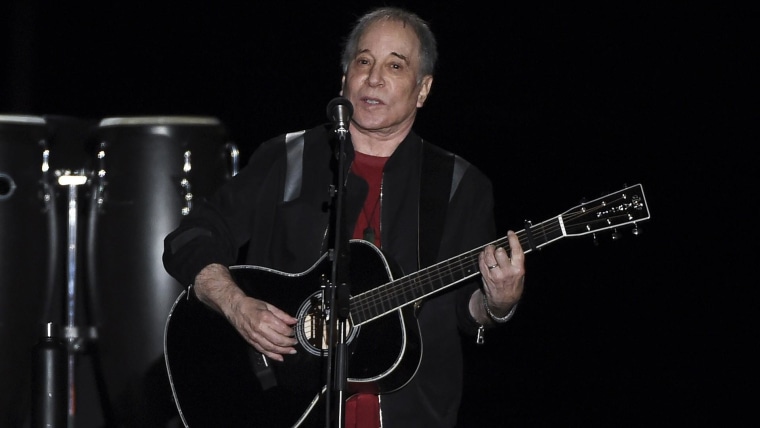The best day of Paul Simon's life may just have been Dec. 7. That was the day it was announced that Bob Dylan, Simon's longtime Columbia Records label mate, had sold his catalog of songs to the Universal Music Publishing Group, Columbia's rival.
Always a ruthless operator, Simon no doubt saw the sale by Dylan to the rival company as a golden opportunity. Surely, the brass at Sony, which owns Columbia, wouldn't want to also lose Simon's lucrative publishing catalog, which includes his classics with Art Garfunkel, like "Bridge Over Troubled Water" and "The Sound of Silence," as well as solo hits like "Still Crazy After All These Years" and "You Can Call Me Al" — more than 400 titles in all.
And so, Paul Simon has become just the latest top-tier songwriter to cash it all in and sell his catalog of songs. In the past several months — along with Dylan's sale, reported at $400 million — artists from Neil Young to Stevie Nicks and from Rihanna to Ryan Tedder of One Republic have sold all the publishing rights (or, in Young's case, half), allowing others to exploit their works in the future in just about any way the buyers see fit.
For the average listener, that means you'll be hearing Paul Simon's songs in not just the usual places, like films, Spotify and YouTube, but also on TikTok and whatever comes next, plus, most likely, in commercials hawking Cadillacs to Kit Kat bars.
Why shouldn't Paul Simon cash out? He's 79, and he's earned it.
The rights to a song are a little-understood but incredibly lucrative side of the music business; hence the record sums that publishing giants like Sony and Universal and upstarts like Hipgnosis Songs Fund and Primary Wave are ponying up.
What Simon and his contemporaries are selling are the copyrights for the songwriting, which are very different from the rights to the recordings he made with Garfunkel or as a solo artist. Simon is reported to have owned his songwriting catalog outright, and Sony is reported to have purchased 100 percent of the rights to his songs, so any future income that would have gone to Simon as the songwriter and copyright owner if anyone were to record or use his songs will now go to Sony.
If the sale all feels a little beneath a '60s counterculture icon — especially one whose early songs soundtracked the Boomer generation (including actually acting as the soundtrack to the 1967 Mike Nichols film "The Graduate," starring Dustin Hoffman) and who remained relevant well into the MTV era with his "Graceland" album — ask yourself this question: Why shouldn't Paul Simon cash out? He's 79, and he's earned it.
It may feel as though he's saying "screw you" to all the folk-loving fans who grew up with him (who are no doubt listening to his recordings on Spotify — which pays him pennies, of course — in their Audis), but Simon has never worried about what anyone thinks of him. Remember, this is the guy who, when the mood struck him, broke Art Garfunkel's heart countless times over the last 60 years, who has unrepentantly taken from up-and-coming artists, who acted like an imperialist conqueror if it suited his artistic needs and who, of course, was allegedly to have shoved his wife of then more than 20 years. (Both were arrested on domestic violence charges after that fight in 2014; prosecutors dropped the charges in both cases.)
You'll be hearing Paul Simon's songs in not just the usual places, like films, Spotify and YouTube, but also on TikTok and whatever comes next.
And let's face it: Simon hasn't had any kind of hit in more than a decade, and he is hardly part of the cultural firmament anymore. At his age, looking down the barrel of his dwindling ability to perform, not to mention the unrelenting march of time and history that has already begun to make his music into little more than a period curio, it's probably the smart move to take the money and run.
Because while the vast majority of the songs that Sony bought from Simon will become all but worthless in the not-so-distant future, not everyone can write "Homeward Bound" or even "50 Ways To Leave Your Lover." So why not capitalize on Sony's hurt feelings over losing out on Dylan's masterworks?
There's another, darker reality assuredly at work. While the Beatles' and Dylan's places in history — not just musical history, but history — are no doubt etched in stone, even their contemporaries, like Young, are beginning to fade from relevance. It's hard to imagine that in 200 years or more — when historians dig into the culture of the late 20th century — anyone but the Beatles and Bob Dylan will be worth more than a passing mention.
That means Young and Joni Mitchell and Bruce Springsteen and, of course, Paul Simon — all giants in their day — will be no more than footnotes, at best, to Dylan and the Beatles, if only because history is a blunt instrument and doesn't have room (at least not in the broadest sense) for subtlety.
So, Paul Simon, who is essentially an also-ran '60s icon on a centurial or millennial scale, is making a rational calculation. He's cashing out while he can in the hope that the broader commercialization of his greatest works might just secure him a better place in history — if even temporarily — no matter how sad an indictment of our times that may be.
"sold" - Google News
April 02, 2021 at 03:30PM
https://ift.tt/3mh3u10
Paul Simon sold his catalog to Sony for millions. He'll still end up a historical footnote to Dylan. - NBC News
"sold" - Google News
https://ift.tt/3d9iyrC
https://ift.tt/3b37xGF
Bagikan Berita Ini















0 Response to "Paul Simon sold his catalog to Sony for millions. He'll still end up a historical footnote to Dylan. - NBC News"
Post a Comment